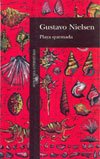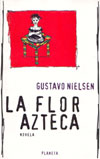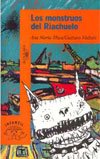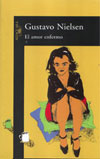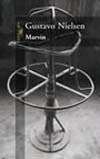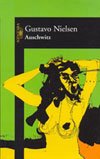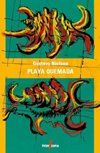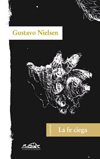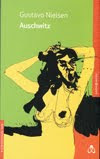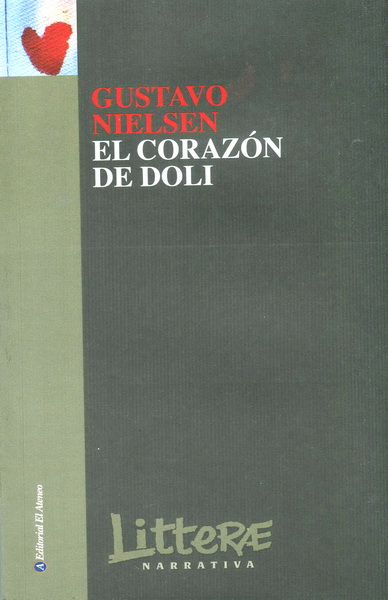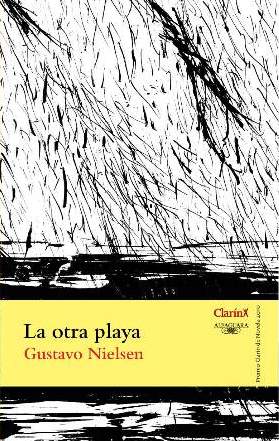COURTESY COFFEE ON THE BUSES
In the stereo of the Valiant, on the way to Necochea, the English lesson tape went slowlier than in other tape machines. At least the kid felt it this way. The Valiant was a big and sturdy car, very sturdy, his father always said so. “If I want to, with Walter I can move mountains”. Walter was the name of the car. His father had taught him that you have to give a name to your dick and to your car. The boy’s name was Marcos, the boy’s dick name was Beto; Marcos also had a poodle called Enrique, but he had left it in Buenos Aires. He stretched his hand to push the stop button.
- English or the tables – said the father.
- All the way?
- At least until we get to Ayacucho.
They were driving along a recently repaved provincial road. The only traffic there were a bus line and a few cars. The father preferred that road because he could travel comfortably. Walter, the father said, also liked this road better than road 2 because here there were less collisions. The only problem was that there was only one gas station, half way, and to arrive to destination Walter needed two full tanks, exactly. So he had to make sure that the tank was really full, both when leaving the Capital City and afterwards. The father had no confidence in the gas dispensers figures and he always required that the gas would overflow the tank. He made this trip twice a month.
- Dear Mum and Dad. My first day in England was OK.
The father repeated the phrase and he looked through the window. It was close to dawn; a red mist tinted all the objects spread along the country side.
- One has to repeat. If not, there is no use. Go on…
- “Diar mam and dad: Mai ferst dai in…” - Marcos hesitated.
- “Ingland”, England…
- “…Ingland… was okey”.
- The train arrived on time and I went to the school .
- I prefer the tables.
The father put off the stereo.
- Choose one – he said.
- Number 2.
- A difficult one.
- Number four.
- Let’s see number 9.
All the trips were the same. Repeat, repeat, repeat. The father called that activity “to profit from the time”. The road was a strip running under the lights and the two of them alone, in the cabin of the Valiant “profiting” from the dead hours.
- Nine times seven?
Marcos unwrapped a sweet. He placed the wrapping paper on the seat. It was a lemon sweet. He put it in his mouth.
- Sixty three? – he asked.
- It has to be with more assuredness – said the father. He took the paper and crushed it -: Walter doesn’t like this. That’s why we have a waste bag.
Marcos opened the bag to put in the crushed paper.
- Nine times nine?
When he was smaller, Marcos thought that that idea of Walter liking or disliking something was cute. His father kept on repeating that as if convinced that Walter was a bright green real person. The joke was no longer cute.
- I said “nine times nine”.
During the last hours of the evening, the metallized paint resembled the brightening powder of the “cars and tractors” cards that his father gave him every friday, when he got back from work.
- Eighty one?
The father nodded.
- It has to come out automatically – he added-. Fast and sure, like Walter.
While saying this, he tapped on the steering wheel. Marcos pushed the eject button. The tape showed out from the stereo and the sound of the radio started. Marcos tried to search for music, but the father pushed the tape back in.
- We had a coffee and talked about the course…
He lowered the volume.
- I wanted to see what was going on – he said.
- Nine times five? – the father said.
Marcos yawned.
- Is that so difficult, nine times five?
- Forty three – said Marcos.
The father frowned.
- Forty five? – attempted Marcos.
- Aha – said the father-. Forty three! – he bit his inferior lip–, even Walter knows that the number five table ends in zero or five!
- O.K. That’s enough.
- Not possible…
- I do not want to go through the tables anymore.
- As if you knew them…
- Doesn’t matter.
The father shook his head.
- As far as you keep on making mistakes, I will continue to ask you. Until you learn them.
Marcos was about to say “I don’t want to learn” but he didn’t. The father insisted:
- One has to propfit from the time while travelling…
The tape ended and it started to rewind. Both sides with zero volume were equally mute. Like the landscape on both sides of the road.
- Seven times nine?
- Who cares…
- Seven times nine!
- Sixty… two.
The tape was full of strange words same as the country side which was full of ugly animals.
- Sixty two! - screamed the father-. Are you pulling my leg?
- Yea…- said Marcos, deviating his sight to the outside
- Nine times seven is sixty three and seven times nine is sixty two? Isn’t it the same thing?
- Yes.
- Then?
- Sixty three – amended Marcos.
On the other side of the road there were a cow and her calf. She was tied to a pole from the wire fence. The calf approached her to smell her and then backwards again. That was all Marcos could see under the last light of dawn. “He is happy because nobody asks him about the multiplying tables”, he thought.
- What if we eat?
- O.K.
Marcos searched in the back pack for the plastic box with the food. He took two plastic glasses and a thermos filled with coffee.
- Be careful – said the father.
- Yes.
The father didn’t like to stop during the trips. In that deserted road it was justified: there was no place for you to stop at, except from the only gas station, to pee and load the tank. When they travelled along road 2 there were many places. On those trips, the mother always wanted to stop to drink something, or, as she used to say, “to stretch the legs”. Marcos also, he liked to buy sweets or a magazine. But the father was the one at the wheel, and he liked to drive non stop. That’s why the mother was not going to Necochea anymore.
- Prepare the sandwiches inside the plastic box, so you don’t drop the crumbs on the floor.
To stop to eat in the middle of nothing was nonsense. Marcos could prepare the sandwiches with the car in movement, he was a good copilot. The father always said so. A good copilot should keep a conversation with the driver and he should pour coffee. Although what Marcos really wanted was to be a driver.
- Mayonaise?
- No. Do not put in yours either. Your mother’s idea, the mayonaise. Quite an idea…
- I like it – said Marcos, but he didn’t open the package. He did put two slices of ham instead.
The father always said to him that he was not going to teach him how to drive until he learnt the tables very well, and at least the first two tapes of “Learning English” from the “Work in Progress” . “Up to Course Number Three”, he said, “minimum”. Then to learn how to drive became Marcos’ problem: the sooner he took care of the English, the sooner he would be trained on how to drive.
- It gets dirty, Marcos – said the father.
Marcos wrapped up the father’s sandwich in a napkin, as he had taught him. He handed it to him. The father took a bite.
- Good sandwich – he said while chewing –. Seven times seven?
Marcos poured coffee, half cups.
- Not while we eat – he said. The phrase was his mother’s.
- Not while we eat… - the father repeated, mockeringly, as if he were saying “I know those words”.
Marcos closed the thermos again and put it into the back pack. He took a sip from his glass. He remained with the plastic box opened on his lap. There was enough bread and filling for two more sandwiches. The car slipped over a dead animal, and this made the coffee shake in Marcos’ glass.
- Was there any spilling?
- No.
The new road was full of dead animals, many more than on road 2, although there were many more cars along the number 2. Marcos thought this was because the road had just been opened. The animals would resist changing from their usual itineraries, then they would cross the paved strip and many of them got crushed. Their guts appeared under the lights of the Valiant and they looked like the monsters in the phantom train. At that point there was nothing else to see.
- Walter hates to step over dead animals…
Marcos new that Walter was unable to hate. Walter was a car, no matter how his father would caress and talk to it while washing it. This was a metaphor, his teacher at school had taught him that, because Marcos liked reading very much and he had read something like what his father did with the car in a Salgari’s novel. The one in the novel was a horse, and this justified the love a little more. He also loved very much Enrique, his poodle. The teacher had told him that this was called personification. This occurred when a person idolized an object or an animal. Then the teacher used the word metaphor. Marcos could not understand this fully. Something like a curtain of locust appeared and stopped his thinking and the Valiant’s speed.
- Waw! - Marcos said.
The locusts smashed on the windshield and made the noise of broken stems. It lasted for several seconds; then the road reappeared. The father put on the windshield cleaners with soaped water. A paste was formed over the glass. He had to stop the Valiant on one side of the road, although they were very close to the gas station. He took a mop from the locker.
- When I tell you, you pour some water by pushing this button.
- O.K.
The father put on his pullover and stepped out. The night was cold, like any other August night.
- Now.
-There it goes.
Marcos took advantage of the situation and changed the English language tape for one by Sui Generis . He put it on without sound, as if it were the other tape. The father came back to the car, he gave him the mop so he would place it back in the locker and he asked him if he had finished with the coffee.
- There is still some, but it’s cold.
Marcos showed him the glass.
- Aren’t you going to drink it?
- No.
- Give it to me.
He threw out the remaining coffee through the open door:
- So you do not spill it.
He closed the door and restarted the car. Marcos bit his sandwich in case his father would start again with the multiplying tables. He was going to eat it very slowly. Up front, in the distance, one could see only one red light, very dim, as if it were from a scutter.
- I bet that is an old truck – he said –. If I win, I will test you on table number seven, all of it, and number eight too.
- And if I win?
- We listen to a tape.
- But not the English language one.
- My word.
Marcos looked forward. When getting closer, the lights of the Valiant illuminated a truck with the suspension flattened by the heavy load and the bumpers tied up with wire. A deserted road like this one, with no indications or services, or road police, it was the adequate place for torn down vehicles. The Valiant, which in town was thrash, looked like a raw diamond here. The father did not surpass the truck, although he dimmed the lights.
- I won - he said.
The father had not surpassed it because they were very close to the gas station entrance. Marcos put the sandwich in the plastic box and he closed it. He saw how the truck turned right to the unpaved road which went into the YPF gas station. Far off a white and blue advertisement illuminated the three letters. Under the advertisement there was a kind of roof; under the roof, there were two gas dispensers and a van. The father reduced the speed. On both sides of the unpaved road there were deep ditches. He only left the parking lights on.
- What are those morons?
He horned. The truck had stopped mid way. In the back it carried several rolls of wire which looked very heavy. Marcos put the plastic box together with the thermos. The father pushed the center of the steering wheel repeatedly, so that the sound of the horn would be steady. The red light of the truck went off and the one in the cabin went on. There were two men: one was an old guy with grey hair and the other one was in his forties, and fat. Marcos saw the older man manouvering the rear-view mirror in order to focus on the Valiant. The father made some lights. He was uneasy. The two men stepped down from the truck.
- See where are those guys going to get stuck, the fucking bastards.
The father clenched to the steering wheel. The men approached the back of the truck and they stared at the scene. Their overalls were badly stained with grease. They were looking down. They looked like saying “there’s nothing else we can do”. The father insisted with the horn, this caused the old man to frown in a disgusting gesture, half astonishment, half wrath. He moved his hand in the frozen air of the night as if he were scaring a big fly. The truck had stopped just in the middle of the road and there was not enough space for the Valiant to pass. The father winded down the glass of his window. The younger man approached the car to talk to him.
- Good evening.
The father nodded.
- Could you help us a little?
- What’s wrong?
- It’s stuck.
- Check that the bumper is the right height.
- Of course it is, sure.
- Check it, I say. I don’t want to have any problem.
The man snapped his tongue. He had some teeth missing and his beard was several days long.
- I don’t want to do it wrong and you through the wire over me.
- It’s a barrell and it’s empty – the man said -. If you want we may unload it.
- Much better - said the father.
The man went back to where the old man was standing and he told him something. The old man shook his head firmly. His beard had being growing for months; it was untidy and as white as his hair. He looked like saying “if he wants to help us O.K., if not, he will have to wait”.
- Old bastard – said the father.
The young man tried to push the barrell himself, but he couldn’t. Then he moved out to scratch his belly. Marcos thought that that weak old man couldn’t have helped very much. It was not an easy deed. The young man went back to the Valiant’s window.
- If you give me a hand…– he repeated pointing at the barrell.
The father had no intention of stepping down. The exit from the gas station was four hundred meters down front, half a kilometer, at most. He could drive up there and get in from the wrong side, as the road was empty. He would have to wake up the employee, as always. No one who wanted to buy gas was going to be able to while that truck were obstructing the road. He thought about all of that while looking at the young man’s face. He had a scar which started down his hair and divided his right cheek between a ditch and the beard. The father was not going to help that scar face stranger, it was as simple as that. He didn’t want to do it. For him, those two men in overalls were spoiling his trip. They were the obstacle between Walter and Necochea.
- I’m not going to step down – he said.
The man blinked. He looked towards the old man, who had’nt moved and continued with both hands on his waist. He looked at his truck as if it were a dead relative.
- Good – said the man, detaching his body from the door of the Valiant. The father started to wind up the window glass. Before he managed to close it, he heard him insisting:
- If you just give us a little push, we’ll get there sooner – he pointed at the gas station.
-The barrell is very heavy – said the father.
- It’s light… The old man doesn’t help because he has a disk hernia…
The father shook his head. Marcos knew he was not going to get down.
- And how far should I push you?
- Down to the gas dispenser.
The man snapped his tongue again. He had black eyes, as black as charcoal. The father finished winding up the window and he started the car slowly. The man walked forward and he made some indications with his hands. While he was encouraging him to get closer, the old man made a gesture for him to put on the brakes at once. It was the same disgusting gesture from before, like getting rid of a large fly, but even more ostentatious.
- Let’s not scratch their truck – the father thought aloud.
Marcos recognized in the pitch of his voice something that he disliked of his father even more than the torture of the tables. It was the despising tone which announced an act of violence. The old man shouted “enough, are you stupid or what?”, while he pulled from his beard. Then he did what he shouldn’t have done: he knocked the Valiant. Twice on the fender, just to let him know, that either he stopped, or he himself would knock Walter down. The father and Marcos heard the insult very clearly, and they saw and heard the knocks.
- Son of a bitch.
Marcos skin bristled. He saw that the young man tried to smile, just to pretend. The old truck was a piece of rusted iron with wheels. “Garbage”, said the father clenching his teeth. Like the barrell they were carrying on the truck, the one which, at first sight, they took for a rusty pile of wire.
The doors of the truck were open. Just when the man was telling the old man to get into the truck to manouver, the father put on the strong lights. Marcos heard him repeating the word “garbage” just before he felt the Valiant shaking as when starting to push. The old man and the young man run to get into the truck, but the father didn’t let them. He pushed the accelerator pedal very hard; the old car rolled astray, without turning. The end of the move made Marcos slip from his seat. The truck just loosened from the Valiant when it stopped, just at the turn of the road. It went right into the ditch. The two back wheels remained turning in the air, at the men’s waist height. They stood still. The father started the engine and made them the fuck off sign with his hand. The old man had a chance to react and he tried to knock the Valiant on the trunk, but he failed.
Marcos took off his safety belt, which was not properly bucked, and he kneeled on the seat to look backwards. The Valiant speeded to get fast to the gas station. The men had raised their fists; the truck, from the distance, looked like the trunk of a bent tree which somebody had illuminated from the roots. Marcos saw the fat man getting into the car, and the light disappeared.
The father laughed nervously. He parked the Valiant by a gas dispenser and he horned twice. In the nearby van a yellow light was on. It took the man several minutes to appear. The man was bleareyed and he looked sleepy. Hooked to the van there was a dark and dirty De Soto.
- Is it working? – the father asked, while he stepped down,
- Yes.
- What year is it?
- Nighteen thirty six. I should have to tune it, but it still works.
The employee took the hose from the dispenser. The father opened the gas tank of the Valiant. The employee placed the hose, and while he filled the tank, he asked if they had gone through a bad fog.
- Just a little.
- Are you coming from Buenos Aires?
- Yes.
The numbers in the dispenser had started to pass through when the three of them heard the horn. It was like a continuous alarm horn, coming from the dark. Marcos kneeled again on the seat. Those men would have stuck the horn of the truck. The employee put one of his hands on his forehead to focus his sight in the direction of the sound.
- What’s going on? – he asked.
The father didn’t answer; he just moved his head and started to search into his pockets. He pulled off his wallet. The man, who was wearing an overall very much like those of the men, but clean, knew that something wrong was going on at the entrance of his gas station. The father looked at the numbers in the dipenser as if he were trying to figure out an amount. He opened the wallet. All of his movements did not get to distract the employee, who was as stiff as an oak, with his face hardened and the hand on his forehead, as an eyeshield.
Then the light was on again. A strange folding of metal sheets and bushes was suddenly illuminated by this phantasmagoric brightness. “May be it’s burning”, Marcos thought in horror. It was very difficult to know what was going on, and even more difficult to distinguish, among those reflections and shadows, the silouhette of a sinking truck. The employee turned off the dispenser. The father handed a ten bucks bill. The load was less than twelve liters.
- I want it full – he insisted -. What’s going on?
- That’s what I’m asking to myself – the employee said.
He put back the hose in the dispenser and he locked it. The horn stopped for a second, just as if waiting for the father to explain something. The silence lasted almost one minute. The father opened his mouth and then closed it back.
- A couple of idiots… - he tried to start explaining, and the horn started again.
The light coming from inside the van projected in a rectangle over the dusty floor. The employee headed in that direction. The father didn’t know quite well what to do, until he saw him coming out with a rifle and a search light. He just put the wallet in his pocket and opened the door of the Valiant. He looked inside: Marcos’ eyes were bright, as bright as those of a frightened animal.
The employee pointed the light in search of the accident. Marcos was the first to see the young man and the bearded old man, running toward them with the fire extinguisher as a weapon. The light of the search light rocked over them. The father started the engine, shifted the gear and pushed the accelerator pedal. The employee’s rifle continued to aim down to the floor.
In a few minutes they were again on the road. When the only thing on sight was the moon, Marcos settled down again on the seat and put his safety belt on. The father did the same thing. They travelled without talking during the next twelve kilometers. The father tried to put on the radio, but it would go off by itself. He knocked it and the Sui Generis tape went on. Then he pulled off the stereo as a whole and threw it on the back seat, with a strong movement of his hand. He was mad. The lights of the Valiant cut the road into pieces, all the pieces seem the same, except for the crushed animals.
- Give me some coffee.
Pikas, snakes, cats, rats, skunks. Guts and puddles, sometimes a few feathers, only a few. The feathers were quickly carried by the wind. Marcos took the thermos from the back pack. The father still had the money in his hand. The bill was shrunk against the steering wheel. When he realized that, he put it in his pocket as if ashamed. He started saying:
- Before I bought Walter, I travelled by bus…
Marcos gave him the plastic glass, half filled.
- This was when I was a student; your grandparents were alive. The trip in the buses was very tiring – he continued -. It’s ten hours, sometimes even more. They give you two muffins; there is always coffee or orange juice.
Marcos sealed the thermos. The father drunk the coffee in a sip and ask him to pour another one.
-This is against the cold weather – he said -. I always ate the two muffins, just at the beginning and then I went for the coffee. I loved the sweet coffee of the buses.
- Shall I add more sugar? – Marcos asked.
- No.
Marcos handed him the glass. The father continued talking.
- I’m used to drink it like this now. I never got your mother to add enough sugar. The only problem is it’s a little cold.
- Mum drinks it bitter.
- She is bitter – he said.
Marcos did not make any remarks.
- I always thought that the very sweet coffee of the buses helped me travel…
He returned the glass, Marcos wiped it out with a napkin and put it neatly in the back pack. He threw the dirty napkin in the waste bag.
- Once I drunk twenty. The only problem was that I always needed additional food, because of the acidity. Then I would ask the inspector for another muffin. Some inspectors were from Necochea, those I knew and they always gave me some; the problem was with the ones from Buenos Aires. Just try to get a muffin from those if you spoke like someone from the provinces!
Marcos made a grim just to pretend a smile.
- But I was not going to get to Necochea with a bad stomach, because mother, your grandmother, would scold me. Do you remember your grandmother?
Marcos shook his head.
- You were a small boy, of course…- and he added -: I was not going to be without those coffees either.
The father looked back through the rear view mirror. Marcos turned his head back, but didn’t see a thing.
- If the inspector didn’t give me any, I searched among the people who were sleeping while walking up the aisle towards my seat. There were always some careless people from whom to steal the muffin. An old lady, or something like that. And I ate one or two more. Sometimes even three or four. I had a young stomach; if I would do that today, I would end throwing out.
He looked back again, through the rear view mirror, and then to the dashboard. Marcos was pending from this last gaze. The needle from the gas meter had started to get into the red space.
- Walter is not going to leave us, don’t worry – he bit his lip -. And about those old days, what else can I tell you… I told you all of these, not for you to do the same thing, but for you to learn that one doesn’t have to steal or insult the people who are helping you, o carrying you… Understand?
Marcos had not understood, however he nodded.
- In life, everything is about learning. That’s why one has to know the multiplying tables, or English. Today I wouldn’t steal muffins, because I already learnt not to do it, I wouldn’t insult somebody who is taking me out from a problem, because life already taught me that… Yes?
Marcos nodded again. The father cleared his throat.
- But not everyone learnt enough, even if they are old. That’s why sometimes one has to give them a lesson… - The father stop speaking for a while, to listen to the sound of his own words –. Never forget this: in life, to learn means to grow… Is there enough filling for another sandwich?
- Yes.
Marcos prepared the remaining two sandwiches, this time with mayonaise. He did not do it in rebellion, but just because he did not realize what he was doing. The father looked at him, but did not speak. Three kilometers before getting to the cross road to Ayacucho, the Valiant started to rattle.
- Go on, go on…
Marcos bit his sandwich. The car stopped a few meters ahead.The father was able to make turn and deviate it to the side of the road.
- Hell – he said.
Marcos looked at him as if asking what was going to happen. The father asked for more coffee.
- The last one – said Marcos.
- Then you take it.
- I don’t want any.
- O.K., give it to me.
They ate their food without looking at each other. Once in a while, the father turned his head to look back.
- May be a bus will show up – he said.
- We didn’t surpass any.
- True. But may be they hadn’t started yet. I’m going to place the signal.
The father put on the sidelights, he rubbed his hands and stepped out. He opened the trunk. He searched for the phosphorescent triangle, he fixed it together and placed it about thirty steps from the car, over the limit of the road. He went back to the car with the hands in his pockets.
- I know what we are going to do – he said, as soon as he got into the car.
He was very happy about his idea. Marcos waited for him to speak, without saying a word.
- Dad is going to get the gas.
- I’m going with you.
- No.
The father coughed.
- Dad goes and comes back – he said -. There are only three kilometers until reaching the cross roads. Dad is going to run down there. Along the other road there are more cars. I’ll ask the first car or bus that shows up to take me to the closest gas station. Then I’ll get a taxi or a bus and I’ll come back with a full bucket. It will only take one hour and a half. May be two. You put on your tape and the time will fly.
- No.
The father grabbed the stereo from the back seat; he connected the wires and he slipped the stereo in. He raised the volume. Sui Generis. Marcos pushed the stop button.
- I’ll go with you.
- No – the father repeated -. I need to go fast, and I will not be able to do it if you come with me.
Marcos looked forward, towards the cold of the night.
- Besides, you could get a cold. In here you will be warm, with the heat, the music and the sweets. You may sleep if you want. OK?
Marcos did not answer.
- Nothing is going to happen. With the locks on, this car is like a safety box – he tapped the steering wheel with his hands –. Walter is going to take care of you.
He smiled. He went out. Marcos saw him running. When he attempted to scream, his father had disappeared in the dark.
He could not stop shivering. He took a blanket from the back seat. He put on the stereo again. Not even the songs amused him. From the bushes, on both sides of the road, there was always something about to show up. “A monster”, he thought. Walter was unable to defend him from a monster, or from anything. Walter was a silly machine, which he was going to manage sometime, but not yet, because nobody had taught him how to. Because he still had to learn a few tables, and a couple of English lessons.
And even if he knew how to drive, Walter did not have any fuel. It was impossible to move it a single step forward. Marcos thought of moving a single step forward himself and he felt like peeing. He was not going to step down in the dark. The snakes which were dead on the road, must have been alive at a point. And they had come from out there, from those bushes through the ditch and onto the road. The same with the rats, the weasels, the skunks. He was going to hold. How much time had passed? He unwrapped two sweets and put them both in his mouth. Eight minutes. Mint and chocolate.
He winded down the window. A cutting cold tightened his cheeks. It smelled of wet grass. He pulled down his zipper and adjusted himself to pee from up there. The pee did not touch the car, however the last few drops fell over the metal green paint. Marcos searched for the mob inside the locker. The drops continued falling down until they wet the handle and further down, to spots he could not reach by bending over the window.
He winded the glass up again. He made two balls with the sweets wrappings. He thought about throwing them into the waste bag, but he straightened them again and he flattened them on the driver’s seat. He raised the volume to the maximum and he shouted, singing on top. “Scratch the stones to death”. He applauded to encourage himself, he opened the door and stepped out.
From under the handle, the pee was divided into three streams which went down to the edge of the frame. He rubbed the mob upwards several times. He was alert to what was going on around him. Then he emptied the thermos, those last drops which always remain inside. The night was full of insects. The croaking of the frogs - or they were bats? - created the atmosphere of a mystery novel. Marcos said to himself that those country side animals would be more afraid of him than he was of them. That was what a man was for. A small one, but a man.
He looked at the road, first forward and then backwards. Two bright dots appeared from the far off darkness of the road they had travelled through. They were coming towards him. The dots were turning into the shape of two lights. Marcos thought about waving to the driver to ask him to pick up his father, whom at this point must had been exhausted. But a chill went through his spine and pushed him into the Valiant. He had a bad thought. He locked the doors. No, it was not the truck. It was another car, a bigger one. He realized that when it was almost by him. He put off the stereo. The car slightly resembled a bull dog. It was the black De Soto from the gas station.
Marcos stooped down and he heard it pass by, like thunder. Then he raised his head slightly, and he hid under the steering wheel. Under the right side of the windshield wiper, the De Soto was trying to park on the side of the road.
Inside of the car there were two grown up people. Marcos recognized them as soon as they step down. One was the fat man, he carried a fire extinguisher. The other was the employee from the gas station: he carried the rifle which he had taken from the van. They left the De Soto with the side lights on. They started walking towards the Valiant.
Marcos took off the keys, he covered himself with the blanket and he slipped down the floor. He had one of the ends from the blanket in his mouth, to avoid that the clatering of his teeth would show where he was. He bit.
- This is it, isn’t it?
- It’s their plate – the other shouted, from behind.
- Son of a bitch.
The knock of the fire extinguisher on the windshield broke it with an explosion, but it was unable to destroy the puzzle it became. They had to knock it one or two times more. The employee knocked with the back of the rifle: Marcos saw it getting through the driver’s window. The seats were covered by a sheet of irregular pieces of glass; the shivering blanket had received them as if they were hail. Marcos took a piece of glass from his hair and he clasped it in his hand, but he did not cut himself. The glass edges were soft.
The knocks sounded on the roof, the hood, the lights, the mirrors. The fire extinguisher drowning into the car frightened Marcos very much: the inside lamp fell down and part of the inside roof fell down too, like a curtain over the back seat. When the men stopped knocking, Marcos released the piece of glass. He waited for a second, with his head covered.
- There are some things – he heard them saying.
He heard the door and how they were struggling. He moved the blanket a few inches, to see what was going on. The man with the scar on the face was pulling out the stereo and in his other hand he was holding two fire extinguishers, the one he had brought with him and the one from the Valiant, and the back pack with the thermos. When he was about to get out, Marcos saw him grabbing one of the wrappings from the sweets. The employee from the gas station took the heavy stuff from his hands. The man with the scar on his face studied the piece of paper. He looked down. Marcos covered himself with the piece of blanket he had moved. He was blind again. The fear made his bones crack. What could those men do to him?. Marcos heard the noise of glass over his head and he felt that the blanket was heavier, and that it moved. The hand of the scar face man had swept a bunch of glass pieces down to the floor, towards the bulky package which was down the blanket. Towards Marcos, who crossed his fingers.
- Let’s go, they are coming – said the employee.
His words were covered by the sound of a horn and the slamming of a door which startled Marcos. The fear made him move and the blanket moved too. He was sweating from his hair to the tips of his toes. He new he was uncovered because of the chill which was wetting his ear, his whiskers. He felt like caughing and he restrained the cough as much as he could. His lids were firmly closed and so were the crosses he was making with his fingers.
When he finally coughed, there was nobody there. He raised his head over the irregular trench of the destroyed windshield. A bus was vanishing up front, with its Christmas lights, on the way to Necochea. The back eyes of the De Soto got smoothly onto the road, as if sipped by the bus speed. One of the windscreen wipers was bended over the hood of the Valiant; the other one was twisted. Marcos freed his breath.
The car was the true image of destruction; bumps on the roof, and no glasses. The wind made ice from the sweat from Marcos’ cheeks. He touched his forehead because he thought he was feverish. He swept with his hands the pieces of glass which were still on the seat. There were some huge pieces, which he threw away through the hole in front of him. He shook the blanket. His teeth were clattering. He wrapped himself in the blanket. The only thing which was uncovered were his eyes, the forehead, the hair and the tips of his ears. He was going to watch until his father came back.
A thought crossed his mind like a poisoned arrow. Those guys had gone to fetch his father. There was no doubt about it, otherwise they would have driven in the direction of the gas station. What would they do to him if they would find him in the middle of the road? The thought filled him with panic. Was it for that reason that he had been gone for so long? How many hours had passed: three, four? The clock from the front board was broken; its hands were hanging like thread. The gas meter was also broken.
He slowly started to weep. He was not afraid anymore of the things from the road, the night, the cold, his own fever; he was afraid of not seeing his father again. He would have not cared about Walter being all knocked down. Nine times nine?. Eighty one. Listen and repeat . Eighty one. Eighty one, eighty one. Billions of eighty ones piling up one on top of the other, in vain, to fit into a remembrance with mosquitoes, with grass and leaves which the wind of the night was beginning to leave into the useless cabin. He put the key into the starter. At this point it was not important if the car had gas or not, if he knew how to drive or not. A car with a copilot but without a driver was, definitely, an empty item. And the open fields around him were ready to fill in all the voids, little by little, very slowly, with the eternal time of usurpers. Marcos took one of the wrapping papers from the sweets and put it in his pocket.
Half an hour later he saw a bus coming from Necochea. He saw how it stopped and the door was opened noisily. He saw the driver who waved at him with a smile. He saw it leaving. On the opposite side of the road there was his father. He was carrying a heavy container hanging from his right arm.
He saw him approaching the car with feeble steps, like trying to understand what had happened. His face looked like the face he had when Marcos answered a multiplying table wrong, when he said eighty two instead of eighty one. But Marcos had already prepared, almost stuck in his mind, the next multiplying tables so that face would not appear again, so this face would be the last ugly face in his father’s lifetime. Marcos thought that, but he did not move. I practiced, dad. You will see.
The father passed his hand through the window hole, he took off the key and moved back to pour the gas into the tank. Marcos imagined him looking at the bumps on the roof, touching the useless trunk, or following with his finger the broken edge of the rear window, the way he had studied a single little glass, only a little piece of glass during the whole night. During the rest of the time I studied the number nine table, dad. He attempted to look backwards throgh the rear view mirror, but the broken pieces were scattered around and were unable to let him see what was going on. For the new shape of the mirror, it was like if nobody was backwards. It was as if nobody had stepped down from a bus carrying a container full of gas. Marcos did not turn his head back. He heard how the empty container was dropped on the back seat; he heard the noise of the tank lid being adjusted. Then he saw his father opening the door, helping himself with his wallet as a shovel, to take the pieces of glass from the seat. He saw him getting into the car, closing the door, starting the engine. Asking him:
- Are you cold?
Marcos nodded without saying a word. The father took off his pullover and passed Marcos’ head through the hole, as if it were a poncho . Then he adjusted Marcos’ safety belt and his own. He accelerated several times, without loosing the clutch. He turned the steering wheel in the direction of the route and the Valiant slowly climbed the edge of the road. One of the front lights, the one on the right, was on.
- What about you, aren’t you going to be cold? – Marcos asked in anguish.
- No – the father said -. On the bus I drank a lot of coffee.
The frozen wind from the speed pierced the two heads with thousand needles. Marcos closed his eyes to avoid the insects; the father put on his glasses.
- Seventeen coffees and eight muffins – he said -. I brought you two, here they are.
Marcos felt the package on his legs and he tightened his kneels, one against the other, so they would not fall. The light weight of the muffins was a caress on his thin legs

